Senate Democrats face steep odds in trying to hold majority in November
- Oops!Something went wrong.Please try again later.
- Oops!Something went wrong.Please try again later.
- Oops!Something went wrong.Please try again later.
- Oops!Something went wrong.Please try again later.
- Oops!Something went wrong.Please try again later.
- Oops!Something went wrong.Please try again later.
The odds are stacked against Senate Democrats this fall, as they try to hang onto their razor-thin majority in November. Not only will they have to defend 22 incumbent seats, many in Republican-leaning states, but they will also have to offset the loss of West Virginia Senator Joe Manchin, who announced his retirement from the Senate last year.
West Virginia is one of the reddest states in the nation and Democrats don't see a path to retain the seat without Manchin. Their best but unlikely hope is to pick up a seat in either Texas or Florida, where Sen. Ted Cruz and Sen. Rick Scott are running for reelection.
There are currently 48 Democrats, plus three independents who caucus with them, giving them a 51-49 majority. Here's where the Senate map stands nine months from Election Day and a look at the earliest fundraising numbers for the year.
Montana
Democratic Sen. Jon Tester is seeking reelection for a fourth term in Montana, a state President Biden isn't expected to win in the general election. In 2020, Trump won the state by a 16-point margin, 57-41%.
Still, Tester is popular in the state, and his approval ratings sit at about 61%, according to a Morning Consult poll conducted last August through October.
Last quarter, Tester outraised his GOP opponent Tim Sheehy, according to Federal Election Commission filings released Wednesday, raising $5.5 million. But he spent more than he raised, roughly $7.2 million.
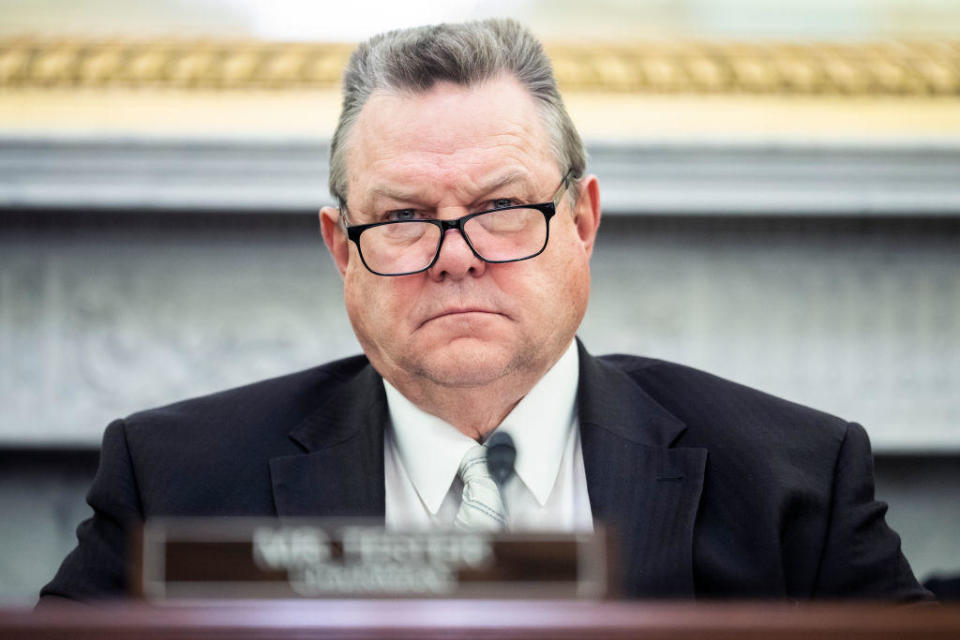
Of the $2.5 million Sheehy's campaign collected, about $450,000 came from personal loans from Sheehy. Going into 2024, Tester had about $11.2 million and Sheehy had nearly $1.3 million.
Sheehy is the CEO of Bridger Aerospace, a federal contractor, and a former Navy SEAL.
"Republicans have landed a very formidable challenger against Tester in Tim Sheehy, but there still is a potential primary looming if Congressman Matt Rosendale gets in," said Jessica Taylor, the Senate and Governors editor for Cook Political Report, a nonpartisan election tracker.

Rosendale lost to Tester in 2018. He has not ruled out a Senate bid, but Sen. Steve Daines, chair of the National Republican Senatorial Committee, who has endorsed Sheehy, is encouraging Rosendale to seek reelection to Congress instead.
Ohio
Sen. Sherrod Brown is defending his seat in Ohio — a swing state turned red. In 2020, Brown's home state voted for Trump over Mr. Biden 53-45%.
"Candidate quality is really Republicans' biggest impediment potentially, despite an incredibly favorable map," said Taylor.
Brown outraised the three Republicans hoping to challenge him in November. He brought in over $6.6 million and spent nearly half of what he raised, finishing the year with $14.6 million cash on hand.
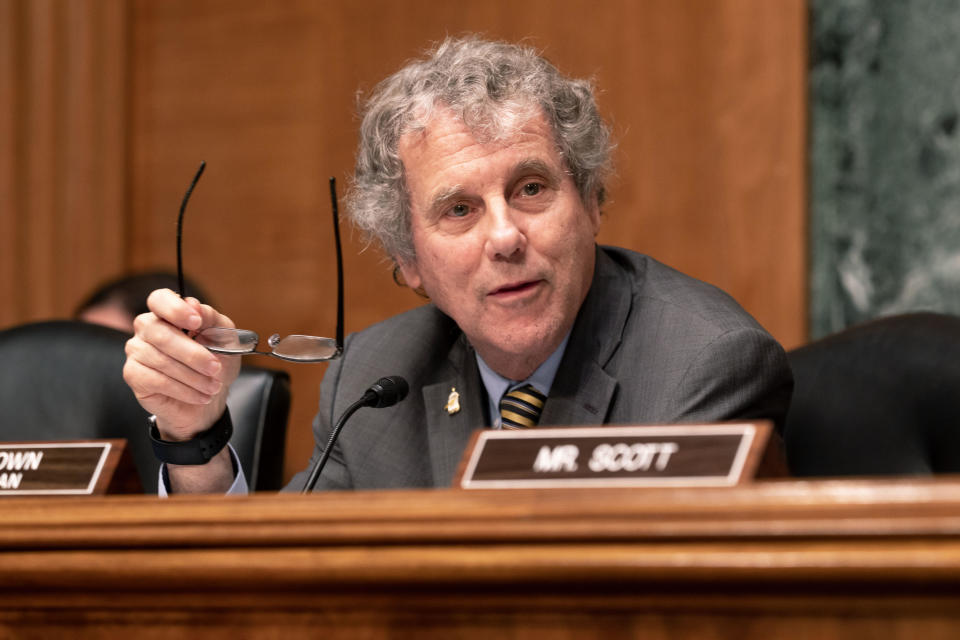
All the Ohio GOP candidates spent more than they raised in the last quarter. Ohio Secretary of State Frank LaRose was the top fundraiser among Republican primary candidates in the state, bringing in nearly $813,000 last quarter and spending $910,000. He finished with $772,000 cash on hand and $250,000 in debt. State Sen. Matt Dolan, who ran in 2022 and lost to J.D. Vance in the primary, brought in about $358,000 but exhausted $2.3 million. He ended the year with $4.8 million cash on hand, the most out of all his GOP rivals, and $7 million in debt. Trump-backed businessman Bernie Moreno, who briefly ran in 2022, picked up $800,000 and spent $3.8 million. He closed out with $2 million cash on hand and $3 million in debt.
Arizona
Sen. Kyrsten Sinema hasn't said if she will seek re-election and the clock is ticking as the April 8 filing deadline approaches. If she chooses to run again, the Democrat-turned-independent will face challengers on both sides of the aisle in the battleground state that voted for Mr. Biden in 2020, but historically votes for Republican candidates.
Arizona Rep. Ruben Gallego is running to Sinema's left. He's a former Marine and has represented Arizona in Congress since 2015. On the right is Trump-backed Republican Kari Lake, a former news anchor who ran for governor and lost in 2022.
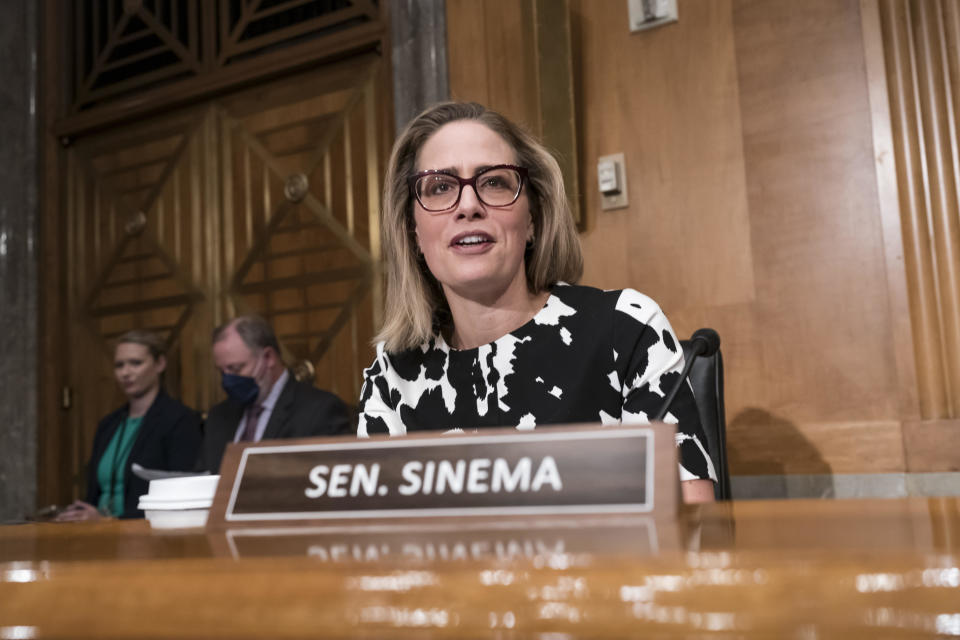
Sheriff Mark Lamb who has served as sheriff of Pinal County, Arizona, since 2017, is also running in the Republican primary but lacks name recognition and the funding to compete.
Gallego outraised Lake, Sinema and Lamb, bringing in $3.3 million and ending the year with $6.5 million in the bank. Lake raised $2.1 million and had $1.1 million left over. She also had $308,000 in debt.
Sinema spent more than she raised last quarter. She brought in $595,000 and burned through $797,000 but has $10.6 million cash on hand.
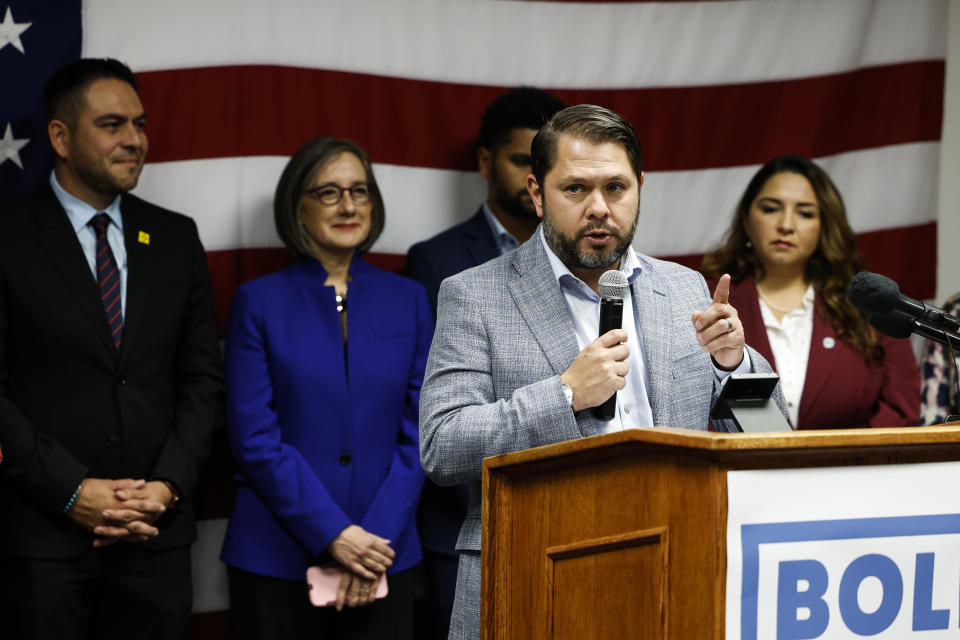
Nevada
Sen. Jacky Rosen is seeking reelection to a second term in a state Hilary Clinton won in 2016 and Mr. Biden won in 2020. Both Democratic nominees won Nevada by small margins.
This past quarter, Rosen outraised the large field of Republicans, hoping to challenge her in the general election. She collected $3.2 million and ended the year with $10.6 million cash on hand.
Sam Brown, a veteran who suffered third-degree burns in Afghanistan, was the top GOP fundraiser in the state. Brown ran unsuccessful campaigns for the Texas House in 2014 and Senate in 2022 — losing to Adam Laxalt. He has national GOP support from Daine's and Senate Minority Leader Mitch McConnell.
Last quarter, Brown brought in $1.8 million, burned through $1.1 million and ended the year with $1.7 million cash on hand. Second in fundraising was Trump's ambassador to Iceland Jeff Gunter with just over $215,000 but spent slightly more than he raised.
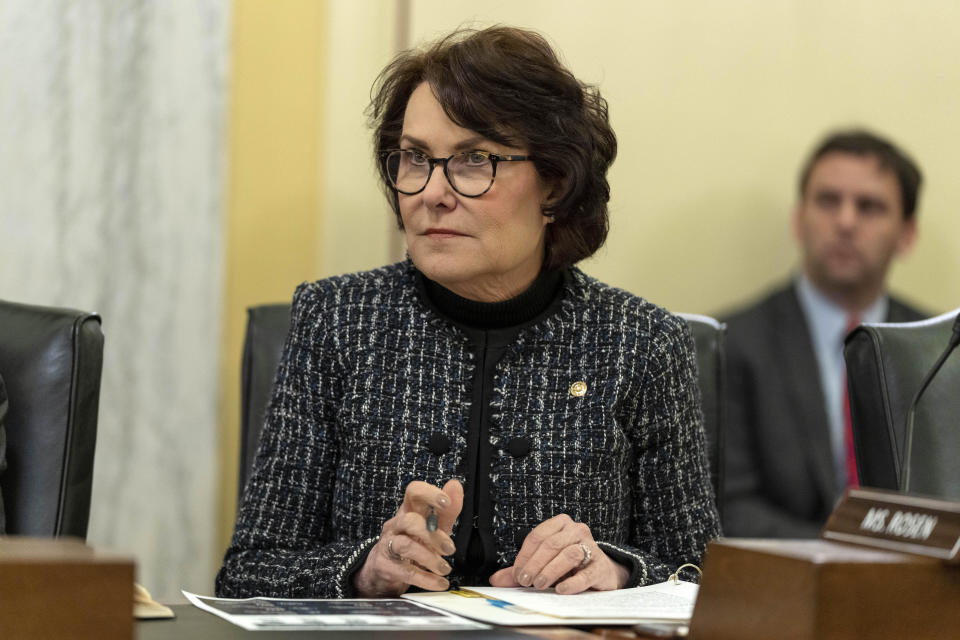
Wisconsin
Democratic Sen. Tammy Baldwin is seeking her third term in Wisconsin which has voted solidly Democratic in presidential campaigns since 1988, before breaking for Trump in 2016. In 2020, the state backed Mr. Biden, giving him a tiny margin of 0.6% over Trump.
Baldwin doesn't have a serious challenger yet but businessman Eric Hovde is expected to jump in the race and has the support of the Senate GOP campaign arm. This would be Hovde's second Senate bid after a narrow loss in 2012 to former Wisconsin Gov. Tommy Thompson, who was eventually defeated by Baldwin.
For now, the only candidate in the Republican primary is Rejani Raveendran, a 40-year-old college student who has never run for office in the state, according to the AP. In the fourth quarter, she raised $2,459.
Baldwin raised $3 million and ended the year with $8 million.
Pennsylvania
Third-term Democratic Sen. Bob Casey will likely face off against Republican businessman Dave McCormick, the former CEO of the Bridgewater Associates investment firm and a veteran who ran for Senate in 2022 and lost in the primary against Mehmet Oz.
Pennsylvania handed Trump a win in 2016, but has otherwise voted for the Democratic presidential nominee since 1992.
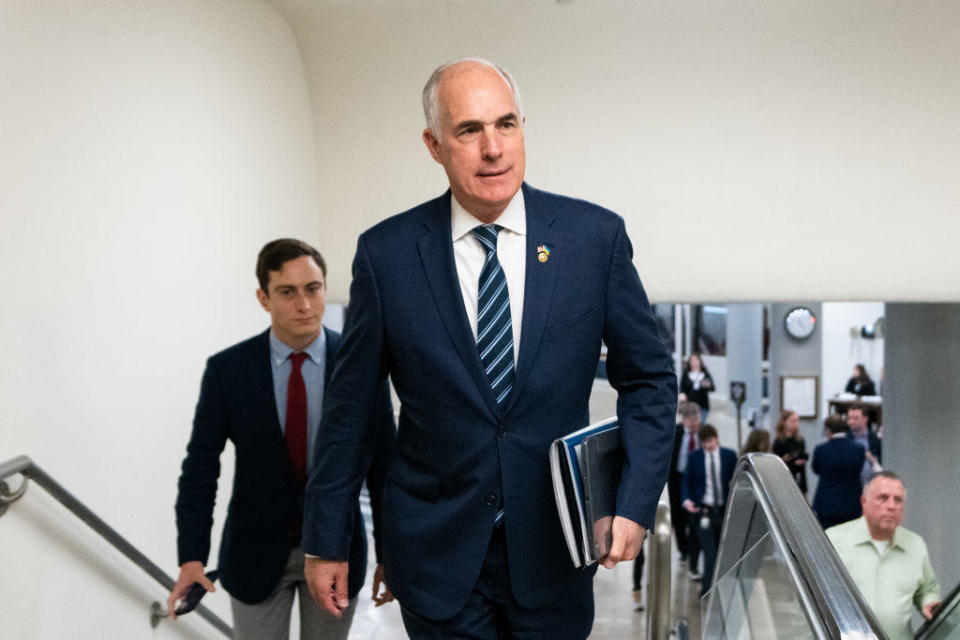
In the fourth quarter of 2023, McCormick outraised Casey by about $2 million. Casey brought in $3.6 million, while McCormick's campaign brought in a total of $5.5 million, including $1 million McCormick contributed. Casey's campaign ended the year with $9.4 million while McCormick had $4.2 million.
Michigan
Democratic Rep. Elissa Slotkin is running to succeed Sen. Debbie Stabenow. Slotkin, a Michigan native and former CIA analyst, currently represents the state's 7th Congressional District.
Last quarter, Slotkin raised $2.8 million and was left with $6 million cash on hand, outraising all her GOP opponents. She had $201,000 in debt.
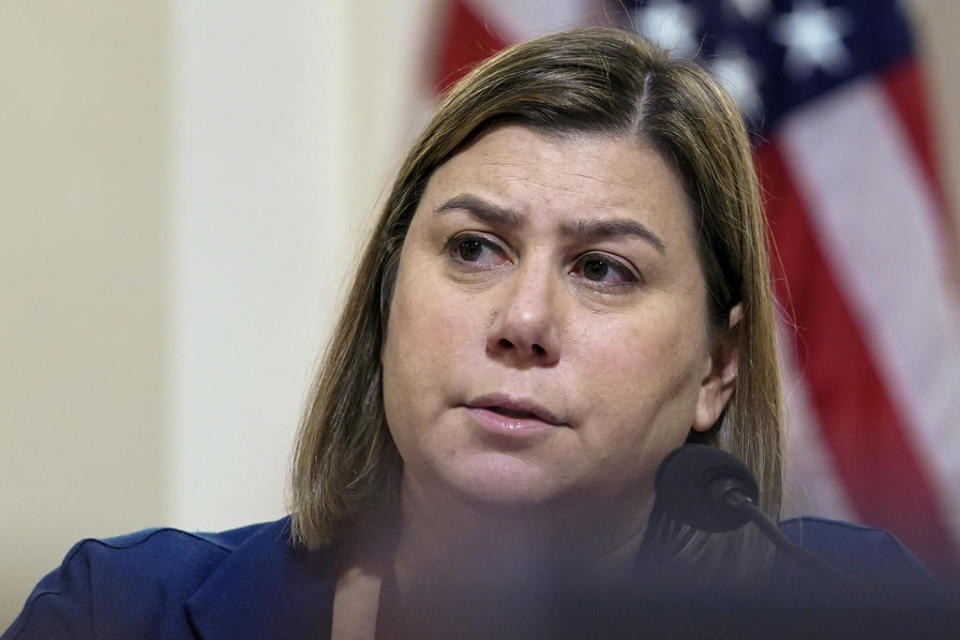
There are five Republicans in the race, so far. Former Michigan Rep. Mike Rogers, who is backed by Daines, brought in $1 million. Rogers contemplated a presidential run but eventually decided against it. He is now endorsing Trump.
Businessman Sandy Pensler brought in $1 million, almost entirely from personal loans. Former Rep. Peter Meijer, who lost a House primary in 2022 to a Trump-backed challenger, brought in just over $508,000, with almost $93,000 in loans.
Michigan upended its Democratic voting record in 2016 when it handed Trump a win by less than a percentage point. Michigan flipped back in 2020 when Mr. Biden won the state by roughly 3 points.
Texas and Florida
Facing a tough map, Democrats are hoping for long shot victories in Texas and Florida. But Texas hasn't voted for a Democratic presidential candidate since 1976 and although Florida has a more nuanced record, it voted for Trump in both 2016 and 2020 and has increasingly leaned Republican.
Democratic Rep. Debbie Mucarsel-Powell, the first South American immigrant elected to Congress, will face two-term senator Rick Scott in Florida.
FEC filings revealed that Scott contributed the majority of funding toward his campaign this past quarter. While the filing states that Scott raised $4.7 million only about $1.6 million of that came from individuals and political committees, with Scott contributing the remaining $3.1 million through personal funds and loans. He also spent almost as much as he raised last quarter.
Democratic Rep. Colin Allred, Sen. Ted Cruz's likely challenger, outraised Cruz $4.8 million to $3.4 million. Cruz, who's seeking a third term, burned through nearly as much as he collected
Saturday Sessions: Billy Strings and Chris Thile perform "I've Been All Around This World"
Iran responds to U.S. retaliation threats after soldiers killed in Jordan
U.S. strikes Iraq and Syria after deadly drone attack in Jordan

